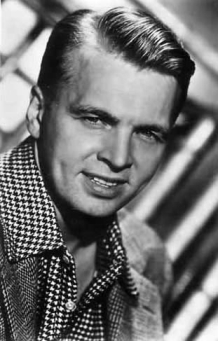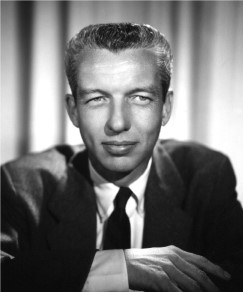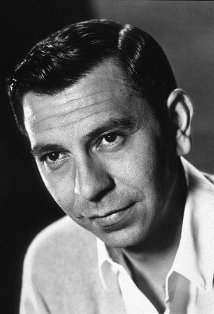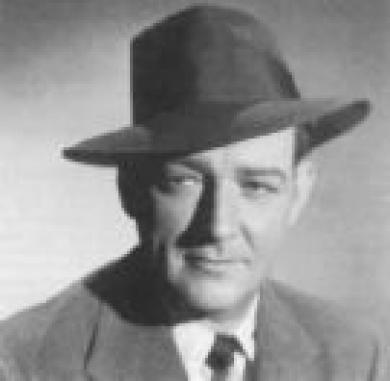
Bob Bailey & Virginia Gregg
Welcome to the Great Detectives of Old Time Radio! A podcast featuring the best vintage detective radio programs. Each week from Monday through Saturday, we feature six of Old Time Radio's great detective series from the beginning of the show to its very last episode. And as a bonus, twice a month we also post a public domain movie or TV mystery or detective show video.
Along the way, I'll provide you my commentary and offer you opportunities to interact.
Subscribe to the show by clicking your favorite podcatcher in the sidebar.
And don't forget to follow me on Twitter and become a fan on Facebook.
- Your host, Adam Graham
Listen to "The Great Detectives of Old Time Radio" on Spreaker.
Currently Featuring
YOURS TRULY, JOHNNY DOLLAR THE FALCON DANGEROUS ASSIGNMENT DRAGNET MR. CHAMELEON THIN MAN… and more!
View all shows
Check out our other shows:
Recent Posts
Golden Age Article, Sherlock Holmes
TV Series Review: Sherlock Series 2
by Yours Truly Johnny Blogger • 2 Comments
The 2010 First Series of Sherlock introduced a clever re-imagining of what the character of Sherlock Holmes would look and act like if he were born in modern times. Episodes were based very loosely on original Doyle stories, though they added their own twists.
Series 2 has some of the appeal going, but too often heads off the rails into extreme improbabilities that takes its post-modern approach way too far.
To begin with, the series opener, A Scandal in Belgravia radically changes the character of Irene Adler from a brilliant talented opera singer to a clever sex worker. The episode works fairly well up to the point as she ends up leaving her locked camera phone with Sherlock for safekeeping, attracting the attention of the CIA, who want the contents of the phone. Sherlock needs to unlock the phone to find the secrets it holds but has to move carefully as he can only make four attempts. But breaking this cypher is beyond him. The battle with Adler has a somewhat satisfying conclusion, despite a few turns that are implausible such as an unbelievable faked death and an ending that was simply impossible.
The episode included an absolutely amazing heart to heart conversation between Holmes and brother and fellow sociopath Mycroft wonder what it’s like to feel things. Really. I felt like the conversation was reworked from a vampire movie to apply to a sociopath.
From a social standpoint, “Scandal in Belgravia” represented a serious downgrade of Adler both in terms of character and mental acumen. Stephen Moffatt insists that he’s defined the characters accurately and that they both “are clearly defined as deranged – it’s love among the mad. He’s a psychopath, so is she.” I would challenge anyone to read, “Scandal in Bohemia” and come away with the conclusion that Irene Adler was a psychopath.This was Moffat’s decision to play to today’s audiences and it had little to do with the way Doyle originally told the story.
Rating: B
The Hounds of Baskerville
This updating of The House of the Baskervilles to modern day best captured what made Series 1 work well. The story took the basic plot and put a modern day spin on it. A young man named Henry Knight believes his father was murdered by a giant hound more than twenty years previously and that it occurred as a result of government experiments occurring at Baskerville.
Holmes and Watson get into the government facility using Mycroft identification to bypass security and gather a few quick points that make Henry’s father’s theories seem plausible. Then Sherlock actually goes out on the moor at night with Henry and encounters the H.O.U.N.D. and finds himself gripped by true terror.
The mystery is cleverly done and as it turns out, there are two parts to the mystery: the first being what caused Henry’s death and the second is what’s behind all these other sightings of the Hound. Watson plays a prominent role in each. The solution is off the wall, but certainly not out of bounds for this type of story.
Rating: A
The Reichenbach Fall begins promisingly enough when Holmes begins to rise to fame by solving a series of celebrated cases beginning with recovering a stolen painting of The Reichenbach Falls (where Doyle killed off Holmes in 1893). At the same time, Moriarty breaks into the case containing the crown jewels, opens the vault of the Bank of England, and unlocks the doors of Pentonville Prison simultaneously. Moriarty is arrested and then acquitted by threatening all the jurors.
He then proceeds with a plan to discredit Holmes after a visit to Baker Street and assassins move in all around Holmes. Holmes solves the mystery of two kidnapped children of the Ambassador to the U.S. and then the wheels start to fall off. Because the kidnapped girl screams when she sees Sherlock, Sgt. Sally Donovan reaches the astonishing solution that Sherlock must have done it as he was the only one who could have solved the case and he did it all on the basis of one footprint. Of course, she doesn’t add that it also included analyzing all the elements present in that footprint which was far more complex.
The story then turns to Moriarty’s attempts to discredit Holmes capped off by the allegation that there was no Moriarty but that Holmes had hired an actor to play the part and that Holmes faked all of his cases. This blew the mind of some reviewers who praised the piece, mine was unblown after about twenty seconds when I thought, “Hired him with what?” Holmes did not have the money to pull off this fraud, so the whole thing was beyond ridiculous. If not for the police buying the story and Holmes’ response, this would have been an interesting farce about media sensationalism.
As for the ending, Emily Perrin wrote a piece for Tor.com in which she explained how “The Empire Strikes Back” ruined many sequels which tried to copy Empire’s formula. This may be the case with The Dark Knight and the first in the case study may be Sherlock, Season 2.
The bright spot of this episode was Martin Freeman. He turned in a solid performance as Dr. Watson, the only character who didn’t seem to lose his mind in the midst of this episode.
One question raised by this episode and never really answered is why Holmes fights “on the side of the angels.” And its never answered.” In the “The Final Problem,” Holmes risks death to challenge Moriarty because he planned to rid England of Moriarty’s influence. Holmes declares, “In over a thousand cases I am not aware that I have ever used my powers upon the wrong side. ” These considerations don’t seem to figure in for the post-modern Holmes. So it remains an unsatisfying question.
Overall, I’d give this episode a C. From here on out, I’d say my review becomes spoiler-laden, so be advised.
The ending has Holmes and Moriarty atop a high building where Moriarty informs Holmes that the key to hacking any system that assassins thought Holmes possessed didn’t exist. He’d used paidconfederates to achieve his criminal trifecta. He then gives Holmes the choice of jumping off the building in order to complete the disgrace narrative or Watson, Lestrade, and Mrs. Hudson will all be shot by assassins. Holmes figures out that he can extract the information from Moriarty to call off the attacks. However, Moriarty thwarts this by shooting himself in the head.
Why would he commit such a dramatic suicide? Because ” Some men just want to watch the world burn. ” Then Holmes, rather than looking for alternatives such as using an ever-present cell phone to contact Lestrade and warn him, plunges to his death to save his friends, but before doing that, he calls Watson and tells him that the newspaper accounts were correct and that he faked everything including doing research to find out about Dr. Watson. In post-modern stories, sacrifice of life is not enough. Rather, a hero must sacrifice his reputation to feed the cynicism of the masses. so Holmes does so.
Of course, Holmes was alive by the end of the episode. Earlier, he’d met with a forensic scientist, asked for her help, and then the camera cut away. If she gave him a pill that would help him survive a 100 foot drop and bleeding out on the pavement, they ought to sell it in drugstores.
As one reviewer on IMDB put it, “….the saddest part was that was I wasn’t even surprised he lived through that ordeal. That is what this series is about….giving you ‘surprises’ that you never expected…. because said surprises are totally unrealistic.” We can only hope that in Season 3, with Moriarty and the death of Holmes out of their system, that the series moves closer to reality.
Overall series 2 rating: B-
If you enjoyed this post, you can have new posts about Detective stories and the golden age of radio and television delivered automatically to your Kindle.
Golden Age Article, Pete Kelly's Blues
Movie Review: Pete Kelly’s Blues
by Yours Truly Johnny Blogger • 0 Comments
In 1955, Jack Webb brought Pete Kelly’s Blues from radio to the big screen. In 1927, Pete Kelly (Jack Webb) and his band play at a Kansas City speakeasy. Corrupt political boss Fran McCarg(Edmond O’Brien) wants a quarter of the band’s take as it’s new agent at an attempted shakedown. The band says no with hotheaded young Joey Firestone (Martin Milner) being the most vocal opponent of signing with McCarg. The band is run off the road returning from a party and then Firestone is cut down by a mobster connected to McCarg, but supposedly acting Independently, Kelly decides to give in and the rest of the bands in Kansas City follow his lead.
McCarg then tasks Kelly with having his girlfriend Rose (Peggy Lee) sing with the band despite it not fitting with Kelly’s style. However, when McCarg continues to abuse Rose and Kelly becomes suspicious that McCarg may have truly been behind Joey Firestone’s murder, he has to decide whether to put everything at risk in order to stand up to McCarg.
Pete Kelly’s Blues works on a number of levels. First of all, there’s the music. You have performances by the great Peggy Lee and Ella Fitzgerald along with some of the finest instrumental jazz you’ll see hear on any film.
The supporting cast is solid. Peggy Lee turns in a Oscar-nominated performance as an abused, worn out, alcoholic singer. Edmond O’Brien was made to order as the heavy. And in a really surprising bit of casting against type that worked, Andy DeVine turned in a strong dramatic performance as the honest cop with no hint of his usual comedic style and a slightly lower voice pitch.
The movie remains a minor Noirish classic. How well the movie ranks depends on what you think of Jack Webb’s performance as Pete Kelly. This has been the one part of the movie criticized, though I think the criticism is overdone. In my opinion, Webb’s performance as Pete Kelly was for the most part solid.
Pete Kelly has one prime motivation: his desire to play his type of music with his band. That’s why he finds himself working in a speakeasy, even when he complains about the type of lowlifes such as McCarg that find their way in.
Kelly is also the leader of the band, the responsible one. When they attend a party, Kelly is the De Facto designated driver . When McCarg’s threat comes, despite Kelly’s plan to put it to a vote, indecision reigns until Kelly suggests a direction, and it’s Kelly’s decision that allows McCarg to expand his racket beyond just Kelly and his band. This sort of responsible side may be what reminds people of Joe Friday.
Kelly is hard boiled and cynical, but not quite as hard as he seems. The movie hints at this in a couple of ways. He has a pet bird. When he’s pushing Ivy Conrad (Janet Leigh) out of his apartment, she argues for being allowed to stay because Kelly allows a bird in his room. Kelly replies that’s only because if times get hard, he may have to eat the bird. More poignantly, Kelly shows his softer side with his quiet and compassionate interactions with Rose Hopkins. He said little, but his face said it all.
Despite this, Webb’s performance is constantly compared to Joe Friday. I think there are reasons for this.
First, is that Webb was probably one of the earliest victims of television typecasting. The impact of seeing, not just hearing, someone every week in your home for 39 weeks a year for 3 years linked Webb to Friday in a way that was unpredictable. Certainly, Webb wasn’t the first actor to be pigeonholed (see: Basil Rathbone), however it usually required several films to achieve the effect. But the regular recurrence of Dragnet on television presented a problem, and Webb’s previous past as a hard boiled radio eye was forgotten. Thus his entire performance was interpreted through that lens of Joe Friday.
Second, this was not helped by Kelly having two voices for voice-overs. Kelly’s first voice, heard most frequently during the film, was slower and more sardonic and fired off sarcastic remarks like Simon Cowell at a Karoke Bar. The second voice heard on a couple occasions sounded exactly like Joe Friday. My personal theory for this is that these other voice-overs were not initially planned for the film, but were added in post-production and that Webb recorded them at the same time he was recording Dragnet voice-overs. Whatever the case, the new voice-overs made Webb’s job harder.
The biggest problem though was the love angle. There was no real on-screen spark between Pete Kelly and Ivy Conrad. On initial viewing, I thought this was a fault in Webb’s acting, as being too stiff. In the end, the failure was more on the writing end.
Ivy Conrad is a spoiled childish selfish playgirl whose globetrotting and partying lifestyle Pete Kelly holds in contempt. Nevertheless, they get engaged on Ivy’s initiative.
I could easily see a scenario where Pete Kelly goes for Ivy in a case of opposites attract. The stressed out band leaders falls for the woman who tore “responsibility” out of the dictionary and to add to that, she looks like Janet Leight. Unfortunately, the film shows none of that. Kelly seems to be uninterested her, but willing to go along with marrying her.
The love angle was so mishandled, I would argue that if you cut the Ivy Conrad scenes, you’d have a far better film and shorter too. Of course, this doesn’t help Webb much. The blame for the problems in the movie simply moves from the shoulders of Jack Webb, Actor to Jack Webb, Director. When you act, produce, and director, there’s nowhere to hide when it comes to blame.
Of course, overall Webb got far more right than wrong, making a picture that on its merits is above average. What’s maddening about watching Pete Kelly’s Blues, though, is that the film so easily could have been a masterpiece.
Thinking about it gives me the blues.
Rating: 3.75 out of 5.00 stars.
1949-54 Johnny Dollar, CBS, Podcast, Yours Truly Johnny Dollar
EP0685:Yours Truly Johnny Dollar: The Nelson Matter
by Yours Truly Johnny Blogger • 1 Comment
Podcast: Play in new window | Download
Subscribe: Apple Podcasts | Spotify | Amazon Music | iHeartRadio | Email | TuneIn | RSS

Johnny investigates the death of a criminal who made a woman a beneficiary of a $10,000 insurance policy.
Original Air Date: August 25, 1953
Save more and combine hotel and airline fare at http://www.johnnydollarair.com
Become one of our friends on Facebook…http://www.facebook.com/radiodetectives
Take the listener survey at http://survey.greatdetectives.net
Click here to download, click here to add this podcast to your Itunes, click here to subscribe to this podcast on Zune, click here to subscribe to this feed using any other feed reader.
Mutual, Podcast, Sherlock Holmes, Sherlock Old Time Radio
EP0684: Sherlcok Holmes: The Unwelcome Ambassador
by Yours Truly Johnny Blogger • 0 Comments
Podcast: Play in new window | Download
Subscribe: Apple Podcasts | Spotify | Amazon Music | iHeartRadio | Email | TuneIn | RSS
Sherlock Holmes is hired to look into a case involving a new ambassador to England. However, Holmes quickly finds the new ambassador dead.
Original Air Date: September 12, 1948
Become one of our friends on Facebook… http://www.facebook.com/radiodetectives
Call 208-991-4783 to leave a voicemail.
Click here to download, click here to add this podcast to your Itunes, click here to subscribe to this podcast on Zune, click here to subscribe to this feed using any other feed reader.
Let George Do It, Podcast
EP0683: Let George Do It: The Eight Ball
by Yours Truly Johnny Blogger • 0 Comments
Podcast: Play in new window | Download
Subscribe: Apple Podcasts | Spotify | Amazon Music | iHeartRadio | Email | TuneIn | RSS

George goes to a small town to help clean up corruption but finds himself suspected of murder. The murder of George Valentine.
Original Air Date: April 2, 1951
Take our listener survey…http://survey.greatdetectives.net
Become one of our friends on Facebook… http://www.facebook.com/radiodetectives
Call 208-991-4783 to leave a voicemail.
Click here to download, click here to add this podcast to your Itunes, click here to subscribe to this podcast on Zune, click here to subscribe to this feed using any other feed reader.
Forgotten Detectives, NBC, Pete Kelly's Blues, Podcast
EP0682: Pete Kelly’s Blues: Gus Trudeau
by Yours Truly Johnny Blogger • 0 Comments
Podcast: Play in new window | Download
Subscribe: Apple Podcasts | Spotify | Amazon Music | iHeartRadio | Email | TuneIn | RSS

An old friend of Kelly’s is suspected of murdering a local Kansas City mobster.
Original Air Date: July 4, 1951
Take our listener survey…http://survey.greatdetectives.net
Become one of our friends on Facebook…http://facebook.com/radiodetectives
Follow us on http://www.twitter.com/radiodetectives
Click here to download, click here to add this podcast to your Itunes, click here to subscribe to this podcast on Zune, click here to subscribe to this feed using any other feed reader.
Barrie Craig, Podcast
EP0681: Barrie Craig: Sweet Larceny
by Yours Truly Johnny Blogger • 0 Comments
Podcast: Play in new window | Download
Subscribe: Apple Podcasts | Spotify | Amazon Music | iHeartRadio | Email | TuneIn | RSS

Barrie is getting competing offers and a few beatings over a relic from Egypt.
Original Air Date: March 2, 1955
Become one of our friends on Facebook… http://www.facebook.com/radiodetectives
Take the listener survey at http://survey.greatdetectives.net
Give us a call 208-991-4783
Follow us on Twitter @radiodetectives
Click here to download, click here to add this podcast to your Itunes, click here to subscribe to this podcast on Zune, click here to subscribe to this feed using any other feed reader.
Share this:
- Click to share on Facebook (Opens in new window)
- Click to share on Twitter (Opens in new window)
- Click to share on Pinterest (Opens in new window)
- Click to share on LinkedIn (Opens in new window)
- Click to share on Reddit (Opens in new window)
- Click to share on Tumblr (Opens in new window)
- Click to email a link to a friend (Opens in new window)
- Click to print (Opens in new window)




